A Time to Say Thanks!
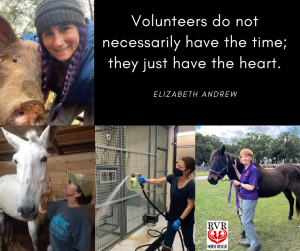 As National Volunteer Appreciation Week approaches, in the U.S. (April 17-23), please join GFAS in thanking all the amazing volunteers for the time, energy, and talent they bring to so many GFAS certified sanctuaries, rescues, rehabilitation and transition centers.
As National Volunteer Appreciation Week approaches, in the U.S. (April 17-23), please join GFAS in thanking all the amazing volunteers for the time, energy, and talent they bring to so many GFAS certified sanctuaries, rescues, rehabilitation and transition centers.
As an international accrediting body, GFAS understands the power and importance of recognizing those volunteers who display a high level of commitment and capability. Volunteers play such integral and varied roles, from mucking barns and coops, to fundraising and assisting with outreach events. We all clearly could not do what we do, without the support of wonderful volunteers.
And, GFAS is extremely appreciative of our own volunteers and dedicated Board members, who make our important work possible. Thank you!
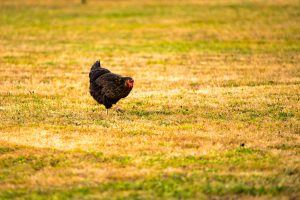 Highly Pathogenic Avian Influenza (HPAI) is now responsible for the deaths of millions of birds, wild and domestic. Positive cases have been identified in both commercial farm facilities, backyard flocks and sanctuaries. A single positive case on a property results in the state “depopulating” (mass culling) the remaining birds, whether or not they show symptoms. We DO NOT want your residents to be affected. Follow this link for quick, actionable resources and checklists on how to protect your residents. See the Open Sanctuary Project link for an updated case map. All sanctuaries with avian residents should consider this a serious threat and adjust biosecurity protocols accordingly.
Highly Pathogenic Avian Influenza (HPAI) is now responsible for the deaths of millions of birds, wild and domestic. Positive cases have been identified in both commercial farm facilities, backyard flocks and sanctuaries. A single positive case on a property results in the state “depopulating” (mass culling) the remaining birds, whether or not they show symptoms. We DO NOT want your residents to be affected. Follow this link for quick, actionable resources and checklists on how to protect your residents. See the Open Sanctuary Project link for an updated case map. All sanctuaries with avian residents should consider this a serious threat and adjust biosecurity protocols accordingly.
Upcoming Webinar for Endangered Species Day
Endangered Species Day, celebrated the third Friday in May each year, is a day to learn about and take action to protect endangered and threatened species. Many GFAS sanctuaries and rescue centers worldwide care for these species, but sanctuaries also play an important role in efforts to protect them in the wild. At GFAS, we believe that true sanctuaries are vital to the advocacy efforts that confront the root causes of why animals are brought into captivity and the threats to them in their natural habitats.
As we approach this year’s Endangered Species Day, we are excited to present a new webinar “Protecting Endangered Species: the Vital Role of Sanctuaries” on Thursday, May 19th at 11 am EDT, featuring speakers from several GFAS certified sanctuaries. Stay tuned for more information and a registration link!
New Opportunity for GFAS Sanctuaries: Round Tables
Part of GFAS’ mission is to promote collaboration among sanctuaries, and we know that our GFAS sanctuaries and rescue centers have so much to share – innovative approaches, lessons learned, and new ideas about animal care, staffing, enrichment, and more. So we are excited to launch GFAS Round Tables, a series of online sessions for sanctuary personnel to meet, ask questions, and learn from each other. Last month, we sent a survey to all of our sanctuaries asking for input on the topics of greatest interest to them, with popular responses including volunteer programs and disaster planning. We will be sending out an invitation for our first Round Table shortly (on a topic to be announced), and each session will focus on a different topic throughout the year.
GFAS sanctuaries can still respond to the survey at this link: https://forms.gle/rNZZGoSQu2sbLrcU8. We’d love to hear from you!
Equine Welfare Data Collective (Fourth Report)– Highlighting Succession and Pet Estate Plans in the U.S.
The latest report of the Equine Welfare Data Collective (EWDC) is HERE covering the year January 2020 to December 2020. This new edition builds on the prior three reports to help us learn more about equines-in-need and the people that care for them. Each report provides a snapshot of data from participating equine rescues, sanctuaries, and transition centers for a specific time period, on a national and regional level. This information continues to help us learn more about at-risk and in-need equines so that programs and support achieve positive outcomes. To quote Emily Stearns, EWDC Program manager, “The data in this report represents the hard work of hundreds of organizations with thousands of people helping tens of thousands of equines each year.”
In 2020, a total of 977 501(c)(3) charities were identified that provided direct care (legal custody and protection) to equines. In addition, the EWDC identified another 247 organizations that provided safety net services without the acquisition of equines. Safety net services included feed banks, veterinary assistance, gelding services, direct placement, and euthanasia-related assistance. Census Region 4 had the largest number of direct care equine facilities comprising the southeastern states from Kentucky to Florida. Census Region 9 had the second largest number of facilities in the southwestern states of California, Arizona, and Nevada.
While trends concerning types of intakes and outcomes remain difficult to identify because of sample sizes, what remains consistent across all reports is the fact the largest number of intakes (50%) are a result of owner surrenders/relinquishments. Information was collected regarding the reasons an owner surrendered their animal. While most might assume that horse-related issues would predominate, in fact, owner-related reasons for relinquishments were greater. Of all the reasons for relinquishing an equine to a sanctuary or rescue, 77% were attributed to an owner’s age, health, finances, and/or relocating. Horse-related reasons accounted for 56% of the stated causes for surrendering their animal to a charity, including equine behavior, age, and health.
Whether you are an individual owner of a horse or a charity rescue/sanctuary caring for many horses, having clear plans in place to address future uncertainties provides protection to keep animals safe, reduces unnecessary admissions to rescues/sanctuaries, and ensures continuing operation of animal welfare organizations.
GFAS standard G-3 (pg. 14) encourages rescues and sanctuaries to have these plans in place, by requiring a written succession plan. Revised-Operations-Standards-2019.pdf (sanctuaryfederation.org) In order to ensure continuous coverage of critical ongoing operations and services, organizations develop plans for an unplanned and extended absence of key personnel such as the Executive Director. Strong succession plans are vital to the sustainability of an organization.
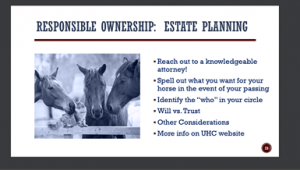 While GFAS standards ensure certified groups have succession plans, individual equine/animal owners need estate plans that include their animals. There are several types of wills and trusts, each have pros and cons, so all individuals should consult a knowledgeable attorney. Identifying who can care for their animals and how the heir takes ownership are some of the decisions involved in creating a plan.
While GFAS standards ensure certified groups have succession plans, individual equine/animal owners need estate plans that include their animals. There are several types of wills and trusts, each have pros and cons, so all individuals should consult a knowledgeable attorney. Identifying who can care for their animals and how the heir takes ownership are some of the decisions involved in creating a plan.
Equine organizations and rescues can help their communities and adopters by promoting estate planning for animals. The United Horse Coalition has some valuable resources on their website including this guide UCH_Estate_Planning_For_Your_Horse_2019.pdf (unitedhorsecoalition.org) and https://unitedhorsecoalition.org/uhc-materials/.
Also, find more resources located on the ASPCA website: Pet Trust Primer | ASPCA
Some GFAS certified equine organizations are aware of this trend and have developed programs to help owners before their animals are acquired by rescues and sanctuaries. One organization, GFAS Verified Illinois Horse Rescue of Will County, is highlighted in this April e-newsletter. This equine rescue organization provides three suggestions to consider when developing a trust/will for an animal.
- Identify at least two individuals and a rescue/shelter that have agreed to provide care if the owner is unable.
- Provide written instructions in the trust/will that may help the equine or other animal transition into their new location including diet, medication, special needs and behavioral habits.
- Provide financial assistance as part of the trust to the extent possible to help the new caregiver with care and medical needs.
Templates to help an owner plan in advance, are provided by Illinois Horse Rescue of Will County on their website at this link Free Contingency Plans | illinoishorserescue.
Foster Parrots: Rising Strong
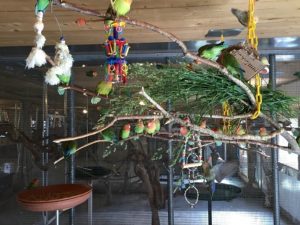 GFAS Accredited, Foster Parrots, in Rhode Island, has been dedicated to the rescue and protection of parrots and other captive exotic animals since 1989. Residents are provided with large, stimulating aviaries that allow the birds to flock together as nature intended. In addition to loving companionship (both avian and human), the birds enjoy enrichment items including appropriate chewing toys, swings, natural browse and water baths. The menu at Foster Parrots provides optimal nutrition through a daily fresh chop of veggies, fruits and nuts. With over 300 residents, that’s a lot of salad!
GFAS Accredited, Foster Parrots, in Rhode Island, has been dedicated to the rescue and protection of parrots and other captive exotic animals since 1989. Residents are provided with large, stimulating aviaries that allow the birds to flock together as nature intended. In addition to loving companionship (both avian and human), the birds enjoy enrichment items including appropriate chewing toys, swings, natural browse and water baths. The menu at Foster Parrots provides optimal nutrition through a daily fresh chop of veggies, fruits and nuts. With over 300 residents, that’s a lot of salad!
Foster Parrots is not only a vibrant sanctuary, but a highly respected organization that advocates for birds in the United States, and abroad. They are a founding member of The Avian Welfare Coalition, speaking on behalf of captive birds since 2000. Foster Parrots has long-standing supportive relationships with conservation projects including One Earth Conservation, Macaw Conservation Costa Rica and Project Guyana. Additional outreach efforts include online and in person educational programs that cater to all age groups and teach that parrots are wild animals long victimized by traffickers and commercial profiteers of the pet industry.
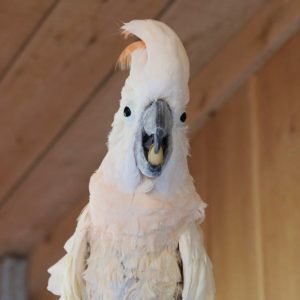 Last spring, Foster Parrots suffered a devastating fire despite having fire safety and suppression systems in place. Many of the birds perished, leaving staff, volunteers, the community and all of us at GFAS, stunned and heartbroken. After a long period of grief, reflection and inspiration gathered from the survivors, Foster Parrots is courageously moving forward and we hope you’ll help them rise strong in honor of every precious soul lost. To learn more about Foster Parrots and support their rebuilding efforts please visit: foster parrots.com/rebuild.
Last spring, Foster Parrots suffered a devastating fire despite having fire safety and suppression systems in place. Many of the birds perished, leaving staff, volunteers, the community and all of us at GFAS, stunned and heartbroken. After a long period of grief, reflection and inspiration gathered from the survivors, Foster Parrots is courageously moving forward and we hope you’ll help them rise strong in honor of every precious soul lost. To learn more about Foster Parrots and support their rebuilding efforts please visit: foster parrots.com/rebuild.
Highlighting GFAS Verified Illinois Horse Rescue of Will County

GFAS Verified Horse Rescue of Will County was established in 2011 to care for equines and other animals in-need and provide an environment of healing for both animals and people. Located on 10 acres with a 28-stall barn, they care for 20 equines at a time as well as goats, sheep, and alpacas which required placement along with the equines. Illinois Horse Rescue of Will County also operates a small barn cat care and adoption program.
This charity has a strong equine adoption program. Equines admitted usually find homes within a few short weeks. This group also has an education program which teaches basic equine care for community groups and heightens the public’s interest in adoptions. As mentioned in this newsletter, Illinois Horse Rescue of Will County provides a template for horse owners to use to plan in advance, for the care of their animals should the owner not be able to, either temporarily or permanently. Planning ahead can decrease the likelihood that an animal will end up at a local auction or require acquisition by a rescue or sanctuary. Free Contingency Plans | illinoishorserescue
True Sanctuary as a Global Vision
Accredited Farm Sanctuary was recently awarded the 2022 Global Vision Award by Travel + Leisure Magazine! View video here.
The awards celebrate exceptional work and innovation aimed at building a greener and brighter planet. The nominees came from a panel of industry leaders and experts across the travel, hospitality, retail, and non-profit industries. Final winners were made by the editors of Travel + Leisure.
Farm Sanctuary provides care for hundreds of animals rescued from abuse at sanctuary locations in Watkins Glen and Acton, California which is north of Hollywood. Famous sanctuary supporters include Joaquin Phoenix, Billie Eilish, Natalie Portman, and Kristen Bell.
At GFAS, integrating the work of sanctuaries with the travel industry is an important step in creating a path for ethical tourism and generating opportunities for education and outreach. Farm Sanctuary has truly proven themselves a visionary in the sanctuary movement since the 1980’s – as one of the first farmed animal sanctuaries in the world. This kind of recognition by a mainstream, widely read travel magazine might have been unheard of in years past, but now showcases just how far the animal advocacy movement has come. Publicity of this kind can maximize the impact for animals that sanctuaries have by driving increased visitation and visibility. By making this a top destination for travelers, Travel + Leisure allows sanctuaries to do what they do best: make personal connections between residents and visitors, thereby solidifying their dedication to the greater cause of animal protection. We celebrate this fantastic achievement and all it means for animalkind.
New Certifications and Renewals
Over the past month, GFAS has renewed one GFAS organization! Congratulations!
Renewals
